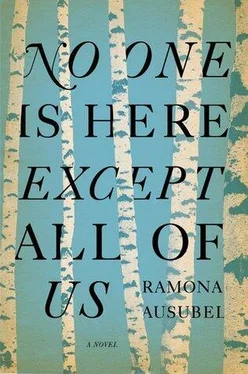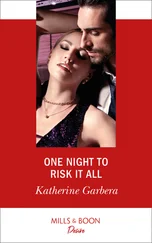“Give me six of those,” a woman in a blue dress cooed.
“I’d give you six of anything you wanted,” he told her. “I’d give you twelve.”
Women wore skirts that left their legs out and men had small cases in their hands. Unquestionably, it was spring: trees were hot with blossoms and people carried their coats, kept putting their faces up to the sun, offering their appreciation to the earth for turning around again. I was bumped and stumbled over and my bag of feathers was almost knocked out of my hand.
“I’d like to show you,” a deep voice said.
A higher one giggled. “Marty is handsome five times over.”
“You want to put money on it?” grumbled one kid to another.
“Hey, lady, buy a paper?” a boy yelled. Above me on wooden tracks a train shook the earth and I ducked and covered my head. People walked on, unafraid. I felt a hand on my shoulder and I looked up to find Edward, tipping his brim. He was thatched by light coming through the tracks. I grabbed him in case he slipped away again. “It’s you,” I stammered. I wished I could lock our arms together.
“Follow me,” he said. “Let’s take you home.”
“Everyone keeps using that word.”
“Isn’t that the whole point?” Edward led me through the crowds of people waiting for cars to pass, over holes in the street that smelled like everything awful had died at once, and to a tall brick building no different from the others on the street. Why this one? I wanted to ask. It had a door, which the man knocked on. Hearing the sound of wings, I looked up to see pigeons dive off the roof, their feathers blue in the light.
A woman opened the door and let us in without asking who we were. The apartment was all beds, tightly made up and stacked. Two girls and a boy were flicking marbles toward a tipped-over cup. I suddenly felt dizzy. I thought I was looking at myself, on the second day of the world, before everything had changed. The shock flickered across my skin. “Who are those children?”
“Tra-la-la,” all the ghosts sang. “No one is here except all of us.”
The woman answered my question without concern. “These are Rosa and Isaac Stoneberg’s children. Rachel, Frida and Abe. Stand up and say hello,” she told the three.
“We’re not supposed to talk to strangers,” Frida said.
The woman laughed. “She’s not a stranger. Well, she is, but she’s our stranger.” She tried to make sense. “This is Lena, who will be living here.”
I was dizzy. I was the stranger and this was my home. They had been waiting for me. Meat was cooking, and tea was placed in my hand.
“Edward says you escaped to Russia? You are lucky to have made it to safety.”
“I was safe?”
“Behind Soviet lines, I mean.”
“We were safe?” My vision tunneled. “Does that mean… Solomon, could I have kept him?”
“Three points!” yelled one of the girls.
“War is so complicated,” the woman said.
“It’s five dollars a month,” Edward told me, saying much more with those kind eyes. “Can you sew? There is work nearby.”
“I think I’m pregnant,” I said. The man and woman whispered back and forth and I did not try to listen in. The teacup in my hand was too hot to hold, but I held it anyway.
“Re-do,” claimed the boy. “That was a bad roll.”
“Nothing of the sort!” one of the girls argued.
“Abe, Abe, can’t get a… Nothing rhymes with Abe!” The other girl laughed.
“You can take some time when the baby is born, for free,” the woman said. Her voice and the pale light of her neck, the brown curl tucked behind her ear, were too familiar. Here, I thought, is where the blood fills our veins again, where our bodies resume their work, where our skin is warm to the touch. That part we took for an ending? In the next instant the girl walks out from the forest into a valley where everyone is alive — boundlessly, feverishly alive — and the earth is raucous with flowers and the day is not at all cold, and the wind picks up a gust full of apple blossoms — the petals every spring has offered up, exactly the same, identical — and the next thing the tree gives away will be red fruits with white hearts, seeds in the shape of a star.
Stars, indeed, I thought, because I was completely surrounded by white flashes, falling in the sky of that room. From my hand, the teacup fell and the sound of it breaking was muffled static. “Out of bounds,” the boy said. And the next thing I remember is waking up on the floor, Edward fanning me with his black hat, the woman whispering and my lap wet. “The baby,” I called, my voice too loud in my ears, my hand on the wet spot.
“Your tea spilled is all,” the woman said. “Did it burn you?”
They did not sit me up, ask me my name or rush me to a doctor. Maybe because they saw the way my sadness had spilled out over the edges of my cupped palms, maybe because they knew the stories that kept arriving with each new shipment of people from the old world, maybe because they remembered all the ways they too were tired — whatever the reason, the man and the woman wordlessly lay down on either side of me. We stared at the cracked ceiling, we ignored the three children asking what was wrong with us, and we wept.
THE BOOK OF THE BEGINNING, AGAIN
It was only women in the room — for the birth, the husbands and children were sent out into the canyons of streets where buildings were walls and even the outdoors was indoors.
On the floor, under my head, was the bag of feathers I had carried here from the temple. I was stretched over a sheet, and at my sides were many warm hands. The women had cloths wetted with warm water, chips of ice for me to suck, pieces of torn fabric for me to bite, and hands, just smooth uninterrupted skin, stroking my forehead and cheeks.
I howled until the room shook and our small glass mourning candles fell off the table. They were unlit and so rolled along, posing no threat, coming to rest on a shoe or the leg of a chair. We could not afford to buy enough candles to mourn all the dead. Instead, before bed each night in this new world we had gathered around the five glass cups, held a match into them where another flame was made, burning with the Reginas, Aarons, Adams and Esthers. The names smoked over us and hovered in the room. I had not heard those prayers since Solomon had said them over the tree bark we peeled off in paper sheets.
The unburning candles rolled and I howled. The women mopped me, dried me, mopped me again. A window was opened to the cold of winter, which whipped us until our skin was tight. A group of boys tossed their voices around on the street below like snowballs. They called each other names and laughed. Inside, we said prayers quietly. My new family laid their hands on my belly. “Beautiful baby, beautiful baby,” they said, “come on out into the world. Today is the day for you to be born. Beautiful American baby.”
“Do you remember the time the whole world was new?” I asked.
“That time is now,” the women said. “That time is always now.”
“Teach me the prayer,” I said. “Tell me what to say.”
Together we made the words, syllable by syllable. “Ba-ruch,” we said, “A-ta,” we said, “A-do-nay,” we said.
“What does it mean?” I asked.
“Blessed are You, God, Lord of the Universe, Who has kept me alive, and sustained me, and made me arrive at this day.”
“Do I mean that?” I asked.
“Of course. It’s what we say,” they answered.
“But was it God who kept me alive? Was it not the farmer? The potato fields? The enemy soldier who gave me bread? Was it myself?”
“God is also what we all are. Anything is God. There is no way to say God without saying Everything.”
Читать дальше












